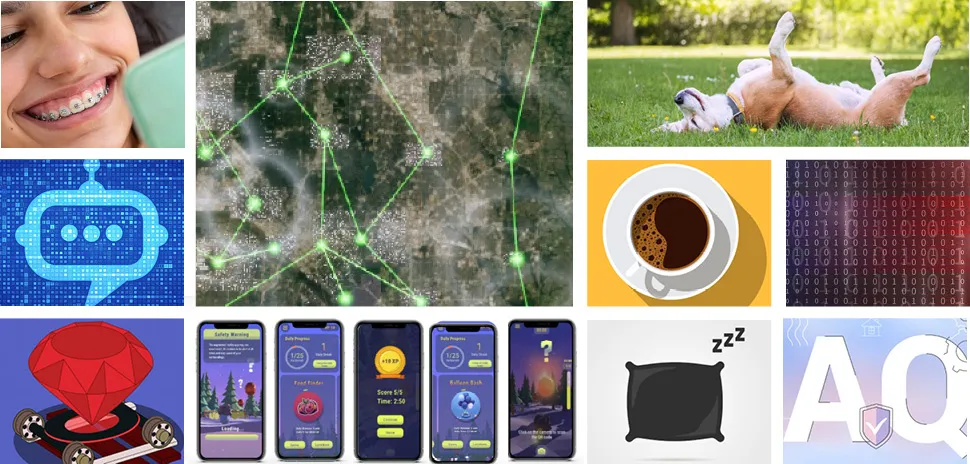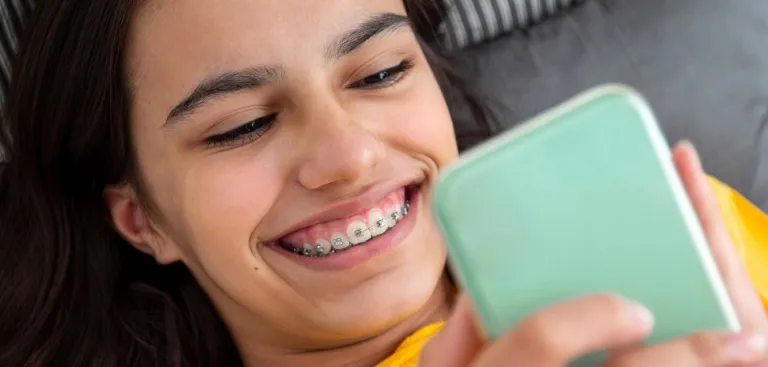Digital Twins to Sleep Quality Monitors: CS UTD Student-Designed Projects Solving Real-World Challenges for Companies

Via Dallas Innovates | Written by Quincy Preston— On the hunt for a resourceful, cost-effective solution to your company’s tech challenges or project pileup? Or maybe you need a product prototype. UTDesign Capstone is now open for company project applications for Fall 2023. But hurry—the window of opportunity closes soon.
Check out these past projects. One of them is bound to spark an idea for yours.
So many projects. So little time. Startups, SMEs, even corporate behemoths—all face the same conundrums when it comes to tech challenges in need of solutions. It’s a daunting scenario, but what if there’s a secret weapon just waiting to be deployed? Enter the UTDesign Capstone Program at the University of Texas at Dallas.
The innovative program functions as a high-powered matchmaker—connecting companies with a pool of senior engineering and computer science students, all ready to dive headfirst into your real-world tech challenges. Think of it as your personal team of young savants, each with their own specialty—AI, AR, IoT, computer vision, game development, bioengineering, robotics, or software development.
Their goal? To solve your tech challenges with out-of-the-box strategies and solutions. And graduate, of course. The capstone is a UTD requirement for seniors in the program.
We’ve compiled a list of some of the groundbreaking projects brought to life under this program. From game-changing public sector innovations to prototype consumer products that could turn the market on its head, and educational tools that could transform the way we learn, each project showcases the diverse prowess of the program and its students’ formidable problem-solving skills.
And one of the best parts for companies? They own 100% of the IP at completion.
The window of opportunity for the UTDesign Capstone Program is open for Fall 2023. Applications for computer science projects are open through July 15, and for engineering projects, August 15.
Pro tip: You can learn more about the program on July 6. UT Dallas’ Don Proeschel will discuss the program at the Texas IoT Happy Hour. The theme for the meeting is ‘Needing Help on Your IoT Projects. Are You Looking Under Every Rock?’
DIGITAL TWIN P25 PUBLIC SAFETY RADIO NETWORK

Department: Computer Science
Sponsor: City of Dallas
Industry: Public Sector
Type of Solution: 3D Modeling
Semester: Spring 2022
Download: PDF
A team of UTDesign Capstone computer science students took on a project for the City of Dallas, developing a 3D virtual twin of the city’s P25 radio network that emergency responders rely on. This digital tool shows how radio signals traverse between various radio towers, allowing emergency preparation officials to simulate scenarios and strategize potential responses effectively, according to UT Dallas.
HANGAR – OPEN SOURCE HACKATHON PLATFORM

Department: Computer Science
Sponsor: American Airlines
Industry: Airline
Type of Solution: Web Development
Semester: Spring 2021
Download: PDF
American Airlines tapped into the talent of UT Dallas to enhance its open-source hackathon management platform, Hangar. An agile development strategy was used during a six-week project at UTD that focused on improving user experience when setting up Hangar. The resulting products included an optimized setup page and “Hangar for Dummies”—a guide designed to help users navigate through its features with ease.
BSA DATA MINING

Department: Computer Science
Sponsor: Boy Scouts of America
Industry: Non-Profits and Activists
Type of Solution: Artificial Intelligence, Machine Learning
Semester: Spring 2020
Download: PDF
In a mission to optimize support for users of the Boy Scouts of America system, UT Dallas students leveraged natural language processing to categorize new user issues accurately. Drawing from past support tickets, the team developed a system that could be integrated into a web-based chatbot.
RELATED PROJECT
CHATBOT
In a related project for the Boy Scouts, a UT Dallas team worked to develop a user-friendly support chatbot that integrates with online resources. This task was accomplished by using Amazon Web Services, BSA APIs, and the data team’s APIs, according to UT Dallas.
WIRELESS LEASH

Department: Computer Science
Sponsor: Halo Collar
Industry:Type of Solution: Machine Learning
Semester: Spring 2021
Download: PDF
Students engaged in the Halo Collar Wireless Leash project took on the challenge of creating a wireless leash that can keep dogs within a set distance during walks. To achieve this, they investigated hardware options—including Bluetooth, GPS, and an accelerometer—aiming to integrate these components for accurate distance measurement between owners and their pets. A specially developed algorithm was also part of their solution.
RELATED PROJECTS
DATA ANALYTICS
In a related project for Halo Collar, students worked on a data analytics project that involved a cloud and IoT solution. The project focused on gathering insights from various Halo data stores. The Halo cloud data store and the product database contained user-generated data and smart collar-generated data. The team’s solution was to query the data from the various data stores and perform analytics via Python utilizing different data science libraries. The project delivered key insights and metrics regarding the product and users, which could help improve the technical functions and business operations of the product.
CANINE ACTIVITY RECOGNITION
Another related project was a canine activity recognition project, working with Paws LLC, which aimed to improve the functionality of the Halo Collars by adding an activity recognition ability to the system. The students worked to increase the collars’ utility for dog owners to better monitor, train, and provide care for their dogs.
DEVELOPING CHATBOTS FOR HOTEL WEBSITES

Department: Computer Science
Sponsor: Cyberweb Hotels
Industry: Business and IT Services
Type of Solution: Artificial Intelligence
Semester: Spring 2021
Download: PDF
A team working on a project for Cyberweb Hotels designed a chatbot to streamline customer information access on hotel websites. By using Google’s DialogFlow service, the students were able to create 25 distinct chatbots capable of delivering automated responses to customer queries, based on specific keywords. The chatbot user interfaces were then hosted on remote websites for customer use.
ORTHODONTIC MONITORING APP

Department: Computer Science
Sponsor: WZDM
Type of Solution: Mobile App
Semester: Spring 2021
Download: PDF
In a bid to reduce routine orthodontic checkups, a group of UT Dallas students developed a monitoring app that uses a sophisticated machine-learning algorithm to assess pictures of patients’ teeth. By allowing patients and their doctors to spot potential issues remotely, the app eliminates the need for frequent in-person visits. The app also includes a feature for verified orthodontists to review their patients’ teeth images, enabling both time and cost savings by scheduling in-person interventions only when absolutely necessary.
GAME SAMPLES

Department: Computer Science
Sponsor: DragonRuby
Industry: Business and IT Services
Type of Solution: Game Development
Semester: Spring 2021
Download: PDF
As part of their project, a team of UTDesign Capstone students built sample apps to help drive further use of DragonRuby, a platform that uses Ruby as its native scripting language. They demonstrated its capabilities and introduced new features in the creation of commercial video games, laying a foundation for future developers.
AUTOMATED FINISHING PROCESS SCHEDULER
Department: Computer Science
Sponsor: Tetra Pak
Industry: Consumer Products
Type of Solution: Software Development and Research
Semester: Spring 2022
Download: PDF
UT Dallas students worked to create a scheduling algorithm that suggests an improved input order for roll insertion into two “slitting machines.” The algorithm attempts to increase on-time order deliveries by reducing bottlenecks caused by human error during manual planning.
INDOOR AIR MONITORING

Department: Computer Science
Sponsor: Quality of Life Technology Labs at UTD
Industry: Education
Type of Solution: Machine Learning, Mobile App
Semester: Spring 2021
Download: PDF
Students enhanced an Android app that gathers data from various sources—including indoor air monitoring devices, peak flow meters, and local weather reports—to predict when a user may fall sick. The app’s machine learning model uses data from the devices, user-inputted responses, and weather data, storing the information on a cloud server for future model refinement.
HOME SLEEP QUALITY MONITORING

Department: Computer Science
Sponsor: Quality of Life Technology Labs at UTD
Industry: Education
Type of Solution: Cloud and Internet of Things, Mobile App
Semester: Spring 2021
Download: PDF
Addressing sleep apnea, a prevalent sleep disorder, a UT Dallas team aimed to develop a wearable ECG device and companion mobile app for monitoring the condition. The ECG signal is read via Bluetooth and sent to the cloud, where it’s processed and transformed into a user-friendly report on an iPhone app.
Want more project inspiration? You can view and filter past projects on the UTDesign website.
Click here to read the article in its entirety.
Source |Dallas Innovates | Written by Quincy Preston
ABOUT THE UT DALLAS COMPUTER SCIENCE DEPARTMENT
The UT Dallas Computer Science program is one of the largest Computer Science departments in the United States with over 4,000 bachelors-degree students, more than 1,010 master’s students, 140 Ph.D. students, 52 tenure-track faculty members, and 42 full-time senior lecturers, as of Fall 2022. With the University of Texas at Dallas’ unique history of starting as a graduate institution first, the CS Department is built on a legacy of valuing innovative research and providing advanced training for software engineers and computer scientists.




